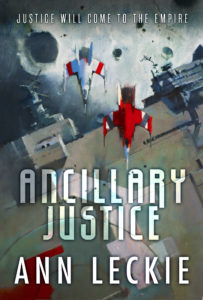The main character is a spaceship. And she is hell bent on revenge.
It is not the plot that makes Ancillary Justice by Ann Leckie shine – the above is all there is to know about it. Nor is it the setting, which is standard space opera fare. It’s the technical mastery it takes to write a first-person novel from the point of view of an AI hive mind. In some of the early chapters Leckie writes from the first person omniscient. I didn’t even know you could do that. Look:
“Is she coming or not? If she isn’t coming she should say so.”
At that moment Lieutenant Awn was in the bath, and I was attending her. I could have told the lieutenants that Lieutenant Awn would be there soon, but I said nothing, only noted the levels and temperature of the tea in the black glass bowls various lieutenants held, and continued to lay out breakfast plates.
Near my own weapons storage, I cleaned my twenty guns, so I could stow them, along with their ammunition. In each of my lieutenants’ quarters I stripped the linen from their beds. The officers of Amaat, Toren, Etrepa, and Bo were all well into breakfast, chattering, lively. The captain ate with the decade commanders, a quieter, more sober conversation. One of my shuttles approached me, four Bo lieutenants returning from leave, strapped into their seats, unconscious. They would be unhappy when they woke.
Justice of Toren/One Esk Nineteen/Breq has a bizarre sense of identity. In the first half of the book, every other chapter describes the backstory, in which the Justice of Toren is a battleship crewed by dozens of officers and running her software in the brains of hundreds of meat-puppet human bodies. In the present day, the Justice of Toren has all been destroyed save for one puppet body. She still thinks of herself as a spaceship. And she thinks of herself as having already been murdered.
What the hell is Justice of Toren/One Esk Nineteen/Breq? She’s AI software running on a human brain. To make things even weirder, another character points out that it’s probably possible to bring back her body’s original owner (some nameless political prisoner). And her remaining body earns command of a ship, so now she’s a spaceship inside a human inside a spaceship.
A lot of the philosophical parts of the book explore what happens when a mind becomes divided against itself. This doesn’t just apply to the spaceship characters.
On the other hand, there’s so much philosophy in the book that not much happens. Add to that a nonlinear plot, an unreliable narrator, and characters who like to talk around the point in a way that would make Jane Austen proud, and you have yourself a tough read. I recommend looking up all the spoilers online first so you can know what’s going on. Then you can sit back and enjoy the thought experiment.

